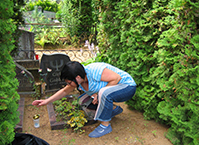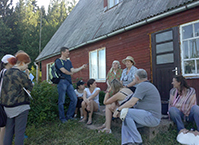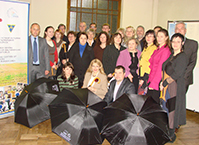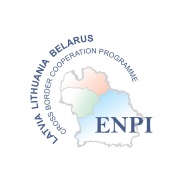Formation of the folklore movement in Upitе
Categories: Holidays and traditions, Anton Slishan
“In fact, the folklore movement as such has existed here since the prehistoric times, this is clear. But its history as an organized folklore movement is newer. The first variant was in the times of kolkhozes, thus, even before the prohibition of Līgo [Midsummer night] festivities, when groups that were similar to ensembles formed within brigades, they staged plays and sang and so on. Then came the ban on Līgo celebration and those ensembles were not heard so much. The other upsurge of folklore took place before the times of Awakening, young people began to celebrate weddings here, in the club, you see, and a number of the same women were coming here to tease in songs. The first one was as if organization, it was an organized organization.
But that real organization began in 1979, when students from Riga, from Conservatory came here, they were guided by Mārtņš Boiko (he was a student then, now he has the doctor’s degree), with the only aim to study Anšipova village, which is now located at the very border with Russia, since there were no folklore records from there. The village, either in the whole Latvia or Latgale, which had not yielded any folklore record. They came, came, you see, why they sent to me, they must have known that by that time I had already started to record folklore myself. You see, I took them there, what there was.. Zabene lived alone, basically it was Zabene, you see. I took them here to meet Brante, but what two women can do. But to that time in 1971, I had already recorded three cassettes, tapes with folk songs sung in this part of the country, they were recorded mainly by Miķelis Jermacāns, (..) the father priest, I just helped. Later I continued that recording. You see, that had already been done. Therefore, after Boiko’s arrival, I decided to show him those records. The club did not exist there anymore; there was the secondary boarding school, where children, who came from remote places, stayed for nights. They were allowed to go there – Monika, I suppose, no she was not the head mistress yet, or she already was, thus, was she the head mistress?, we let them stay for the night there and I trusted them with my tape-recorder and those tapes for one night. And that was, I suppose, on Saturday, and a dancing party was held there. They did not go to the dancing party, how old they were, were they twenty or not, nineteen, eighteen years old, they were playing that tape-recorder and listening to folk songs all night through. On the other day, when I sent my daughter to treat them with milk, she said, they had not eaten anything yet. We met later during the day, they said – your folklore is so rich and you are doing nothing. They said that the following year, in Preiļi, Monika Livdāne would defend her diploma paper exactly about the culture of Latgale, the folklore of Latgale. You should volunteer; they gave me the phone number, I volunteered.
So, then we started to become organized. The older women in Upīte, a bit younger women in Upīte, two ensembles organized the first folklore festival here in August of the year eighty; there were three ensembles: Briežuciems ensemble, that had already been established, Upīte, Rekava ensembles, and also the girls of Upīte school, Aija sang then, she was in Form eight, she sang in that girls’ ensemble. Yes, and Monika Livdāne chose us. And we went, and then everything started. And then Rekava women, the old ones, those who were sixty – seventy years old, or even older, and Upīte women, who then were under thirty up to more than forty, in their very prime. Both our ensembles then were taken by Stalti, Stalti from Riga, actually, all the leading folklorists took us everywhere, wherever it was necessary. We went even to Moscow, when Krišjānis Barons’ festival was celebrated and there was some musical studio known in the whole Soviet Union. And we were taken all around the region, including the partisan memorial sites. We went to Alūksne, there was the competition of the district’s villages, in a word, we were famous. At that time we had young men in our ensemble, we had our own musician. Then, in eighty-three, those same women’s children and grandchildren joined, and my children were there; from the age of three to sixty, (..) I think there were people whose age was about sixty. You see, that was the time of our zenith. But now, those young people married, had to deal with family issues, everybody disappeared, but the initial nucleus stayed, apart from some who had joined, you see, Aija, who had disappeared for some time, Irēna joined, who, by the way, had not been involved, she might have participated in the children’s ensemble, if there was one, then in the children’s ensemble, when she attended school, but I’ll tell you about it later. Such is the history, it ended up so that the last year, or two years ago we received the Folklore annual award as the most saleable ethnographic ensemble or something like that.
Those children, who had finished that school in the times of the ethnographic ensemble, later were guided by Irēna in the children’s folklore group “Upīte”, those who had finished that school organized Upīte youth’s folklore group. Thus that tradition of continuity, and since all of us will die, I think Upīte youth’s folklore group will become Upīte ethnographic ensemble, while Upīte children’s folklore group will make the youth’s folklore group. There are some people from aside joining, but basically it is the local membership. Young men bring their girlfriends or girls bring their boyfriends from the neighbouring villages, but basically the participants are from Upīte.”
Images
Audio
Researcher: Dr. philol. Gatis Ozoliņš, Daugavpils Universitāte













